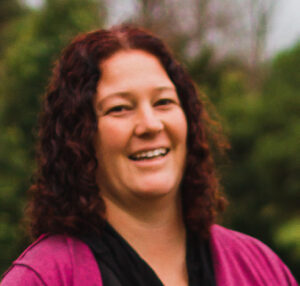Vicky Bloomer, the owner and director of DROP Consulting, has long experience with irrigated agriculture. Her time at the Hawke’s Bay Regional Council, an irrigation company, and Irrigation New Zealand (IrrigationNZ) gave her a thorough understanding of the pressures affecting irrigated farmers, water suppliers, and regulators, which she brings to her consulting work. In this interview, she tells Irrigation Leader about recent changes in metering and data collection and explains why and how Hawke’s Bay farmers can become more water efficient.
Irrigation Leader: Please tell us about the main features of irrigated agriculture in the Hawke’s Bay area.
Vicky Bloomer: Hawke’s Bay is separated into two main growing areas. The Heretaunga Plains are home to thousands of hectares of apples and most of the region’s viticulture. There are also a lot of vegetables that are grown for processing, such as beetroot, onions, and squash, and pockets of fresh vegetables and fruits. It is very diverse. Further south, in Central Hawke’s Bay, you’ll find most of our dairy farms, irrigated sheep and beef farms, and a lot more arable and process cropping. Central Hawke’s Bay is also home to a little bit of irrigated apples and viticulture, but nothing on the scale of the Heretaunga Plains.
Irrigation Leader: Please tell us about your background and how you came to be in your current position.
Vicky Bloomer: My father was heavily involved with IrrigationNZ when I was a teen. He did a lot of irrigation performance evaluation work. He used to take me out on school holidays to be his helping hand. That got me interested in farming and irrigation, but that wasn’t necessarily what I planned to pursue.
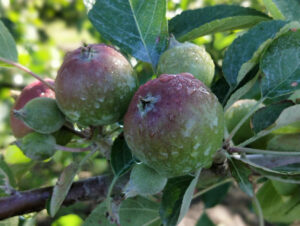
Later, I completed a degree in natural resource management and began working for the Hawke’s Bay Regional Council as an enforcement officer, mainly enforcing the rules for irrigation takes. Eventually, I lost the stomach for enforcement work. The regional council recognized that and moved me to a different team. There, instead of enforcing regulations, I worked with the local irrigation industry, IrrigationNZ, other councils around the nation, and the consent holders themselves to implement water meter regulations. I really enjoyed that role, and it certainly created opportunities and long-term connections nationally.
When I left the regional council, I worked as the service manager for an irrigation company. There, I learned more about irrigation system design, installation, and maintenance. In 2017, I moved to IrrigationNZ on a 3‑year contract to work on a project called Barriers and Benefits to Good Management Practice. It was a fun project, and I enjoyed building the online learning platform and creating the training material.
Because of my water metering background and my connections with the industry and with councils across the nation, I also worked on the Blue Tick accreditation program. This included assessing people doing their water meter unit standards, maintaining the code of practice, and serving as the council liaison.
In 2020, as my contract with IrrigationNZ ended, I used the opportunity to do something I had been thinking about for a while: starting my own business, DROP Consulting. DROP stands for driving resource optimization and performance. I wanted to help farmers and growers do more with less and to support them in navigating the changes to regulation. I was fortunate that IrrigationNZ was going through a restructuring as my term ended and contracted me to continue delivering training and assessment services and working on the Blue Tick accreditation program.
I still do work with individual farmers, which I love, but I find myself taking on larger pieces of work with primary industry bodies and government organizations, both local and central. In my work, I am constantly searching for the balance between environmental stewardship and food production—everything comes back to that philosophy.
Irrigation Leader: What did your water meter regulations work at the regional council entail?
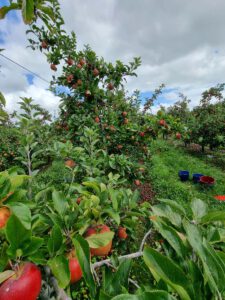
Vicky Bloomer: The Resource Management Act of 1991 governs how we manage water, and the central government wrote a set of regulations under that act requiring all consented water takes of 5 liters per second or more to have water meters installed. To manage our resources, it’s critical that we start collecting this sort of data.
The Hawke’s Bay Regional Council, which manages local water resources under the act, had to implement the regulations. This meant telling the consent holders what they had to do and when. It also meant talking to and working with the local irrigation companies that would be installing the meters for consent holders to ensure that they had the knowledge, skills, and capacity to do the work. The council was also a proactive contributor to the New Zealand Water Measurement Code of Practice. When I changed roles within the council in 2014, I started directly making contributions to the writing of that code.
Over the last decade, there’s been a real shift in how the data are viewed and used. The data now feed into science work programs. I think this shift is critical: If we can better understand the value of the data we are collecting, we should see the data quality improve, because it has meaning and is useful beyond compliance.
This desire for improved data quality led the Ministry for the Environment to update the regulations in 2020. It now sets out a timeline for people to transition to recording data at 15‑minute intervals and transferring it to the local council daily. Effectively, you must have telemetry. This is the next challenge for councils: They must implement this requirement in a phased way by 2026. The first group of consent holders, who have takes of over 20 litres per second (0.7 cubic feet per second) must have this equipment installed by September 3, 2022. Some people argue that requiring 15‑minute-interval data is onerous, but most of our other time-series data, such as data on river flows, is also collected at 15‑minute intervals.
I view this change as a good thing, because we were starting to see a really big shift in how those data were being used. Initially, when I was at the council, gathering water meter data seemed to be about monitoring compliance with consents. As we imported the data, if there was a problem, we would deal with it. If the data showed compliance, they would get saved, but no one really came back to look at or use them.
However, this changed in Hawke’s Bay when the council started doing groundwater modeling and found that water users were allocated more water than the aquifer could sustain, at least on paper. If we’re now using these data for science modeling and long-term trend modeling, we need trustworthy data, which means the data should be gathered by an automated system rather than by hand.
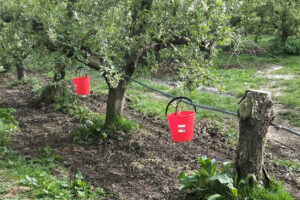
The other thing we’re starting to see is councils indicating that they’re going to use historical water meter data to grant allocations when consent holders apply to renew their consents. Most consents these days last 10–15 years. If you’re going to be granted a historic maximum, you want to know that the data the council is using are of good quality.
Water meter data aren’t just useful for councils. The data are also valuable for the water users. People who are irrigating can use the data to track performance over time, for example if they see the flow dropping. They can do quick checks about the system application, using volume and area to calculate the millimeters applied. Those with telemetry can track flow in near-real time and check for problems on site, such as whether the pump is on or off when it shouldn’t be or whether there is an increase in flow that could indicate a leak.
Irrigation Leader: What are the best ways for irrigated farmers in your region to improve their efficiency?
Vicky Bloomer: We’re quite different from Environment Canterbury, Canterbury’s regional council, which requires farmers to have farm environment plans in which they demonstrate good practice, including soil moisture monitoring with performance evaluations of the irrigation equipment. If the equipment doesn’t meet a certain standard, then the grower is required to fix it. However, the Hawke’s Bay Regional Council is starting to include some of those standards through the consents and farm plans.
There are a couple of ways our growers can improve their efficiency. They can improve their soil moisture monitoring and their decisions about when to turn irrigation on. We still have panic irrigation here, and sometimes growers irrigate just because their neighbor did, even if the neighbor is using their land differently. The apples and the viticultural growers seem to be pretty big on soil moisture monitoring, either with permanent probes or through a consultant service that comes through weekly. Our pasture and cropping people seem to use it less, according to a 2017–2019 study conducted by the regional council and supported by IrrigationNZ. That study saw the regional council and IrrigationNZ work together on an irrigation efficiency drive and bucket test program. It found that there are some inefficient systems around Hawke’s Bay and some good ones. We need to help farmers understand the benefit of having a well-functioning system that delivers even application at the right rate and depth.
Irrigation Leader: How does your time working for the regional council inform your work today?
Vicky Bloomer: The biggest thing I came to understand when I was working at the regional council was that while water was my full-time job, it wasn’t the full-time job of farmers and growers. Farmers are farmers; orchardists are orchardists. Their full-time job includes water, staff management, finance, chemical and fertilizer application, and animal health. That has really helped inform what I do today, because I know there’s a gap there and that farmers need help and support. If I can educate people and help them avoid getting themselves in trouble through a moment of inattention, that is a win.
Irrigation Leader: What is the most important thing for irrigated farmers to understand about the workings of the council and local government?
Vicky Bloomer: I was recently delivering a workshop in a different region, and the group started to get off topic and vent their frustration about the local council. Then, I had to stand at the front and introduce myself. When I told them that I spent 8 years working for a council, the room looked a little bit uncomfortable. I like to explain that council staff are implementing national policy and are trying to do their best with the resources and knowledge they have. I have never met a council employee who is deliberately trying to make things difficult for farmers.
When you’re doing a consent application or going through a compliance process, the one piece of advice that I’d give a farmer or grower is to build a positive relationship with council employees. As with any relationship, it makes things way easier if we get along, even if we don’t agree! We’re all people, and we’re all just trying to do a job.
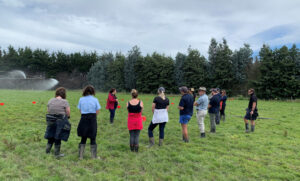
Irrigation Leader: How is the Three Waters Reform affecting irrigated ag in your area?
Vicky Bloomer: The Three Waters Reform was triggered by a water quality issue in Hastings, which is in the Hawke’s Bay region, that led to 5,000 people getting sick, several deaths, and costs of about $20 million to our local economy. In Hawke’s Bay, people are aware of water issues, because we’re aware of the awful consequences of what happened, and we all know someone who got ill. The Three Waters Reform, because it deals with storm water, wastewater, and drinking water supplies, largely applies to our cities, but it will apply to farmers and growers as well, because if you’re supplying drinking water to farmhouses, you now need to meet those drinking water standards. I believe that we do need standards around drinking water supplies because of what happened. Everyone is entitled to know the water they’re drinking is safe.
Irrigation Leader: Are there any other major trends in irrigated agriculture that you would like to discuss?
Vicky Bloomer: Water security is a looming problem. We often talk about New Zealand being water rich. We have high rainfall, but it goes into our rivers and flows into the sea. Storage around here can be a touchy topic. The regional council did look into building storage in Central Hawke’s Bay, and an investment company owned by the council was going to build it. Unfortunately, it got taken to court at the last minute, and the court agreed that a necessary land swap was illegal. This has prevented the dam from being built.
We’ve got the same problem up in the Heretaunga Plains area, where the community knows that it doesn’t have enough water, particularly with climate change, to sustain current activities. The regional council has a project that is looking at how people can save or store water.
It is a big topic, and one that I hope the community can have a mature conversation about in the next 1–5 years rather than in the next 20–30.
Irrigation Leader: What is the best way to balance natural resources protection and agricultural production?
Vicky Bloomer: To balance natural resources and agricultural production, you have to look at whole-system change. There is no way around it. I’m a huge believer that everyone can contribute. Whether you’re a home gardener or a corporate farm, everyone needs to step up and start to use their resources differently. If everyone starts to make some changes to reduce their resource use, we can collectively make a big change.
Irrigation Leader: What is your vision for the future?
Vicky Bloomer: When I was a kid, we had a family bach that my grandparents owned. It was next to a stony-bottom river, and you could see all the native fish swimming around. We would swim in it for hours on end. The last time I went, I wouldn’t have put my foot in it, let alone put my head underwater. My vision for the future is to see healthy rivers and streams come back. I want my kids to swim in rivers like I did 25 years ago. I also want New Zealand to be able to feed itself. Exporting is great, but we also need to make sure that everyone here at home has access to good-quality, healthy, affordable food. My vision is to improve things for our next generation.
Vicky Bloomer is the owner and director of DROP Consulting. She can be contacted at vicky@dropconsulting.co.nz.
